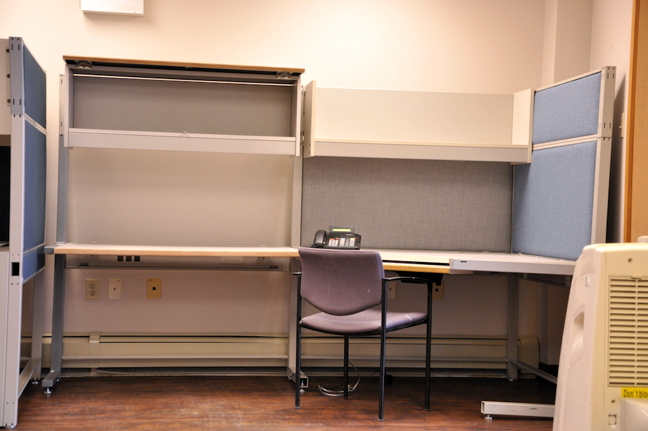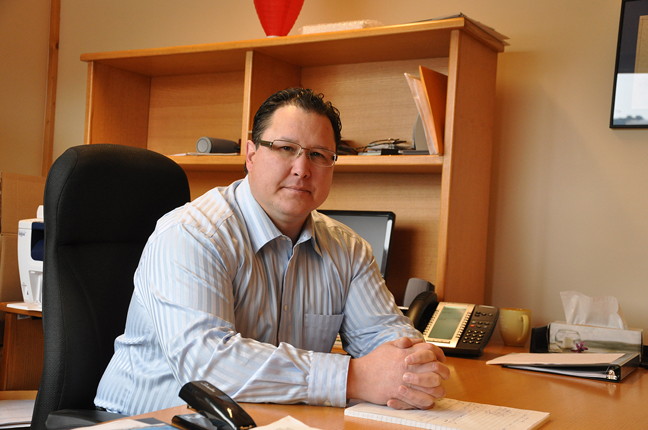Fear, favouritism, clash of cultures fuel high GN turnover, insiders say
Part two in our series on workplace bullying in Nunavut’s public service

The Government of Nunavut will find itself with more empty cubicles like this one if they don’t do more to rid the public service of its toxic work environment, MLAs and experts say. (PHOTO BY THOMAS ROHNER)

Iqaluit-Tasiluk MLA George Hickes says it’s important that GN departments follow the Public Service Act. (FILE PHOTO)

Nunavut Employees Union president Bill Fennell says Inuit employees are often reluctant to formally complain about workplace harassment through the union’s grievance procedure. (PHOTO BY THOMAS ROHNER)

Iqaluit-Niaqunnguu MLA Pat Angnakak says civil servants have come to her seeking relief from workplace harassment because they’re afraid to go anywhere else. (PHOTO BY THOMAS ROHNER)
Workplace harassment in the Government of Nunavut’s public service affects Inuit more than non-Inuit, politicians and experts say, leading many beneficiaries to quit their jobs.
George Hickes, the MLA for Iqaluit-Tasiluk, recently told Nunatsiaq News that some of his constituents have been harassed so badly at their GN jobs, they felt they had no choice but to resign.
And all too often, these constituents are beneficiaries, Hickes said.
“In general, Inuit people don’t like confrontation. It’s a lot easier just to quit your job,” he said.
That could be contributing to the government’s struggle to reach Inuit representation targets within its workforce, which are “terrible” at middle and senior management levels, he said.
According to the GN’s own statistics, beneficiaries filled 24 per cent of middle and 21 per cent of senior management government jobs in 2014. That’s out of a total workforce of 4,529.
It’s interesting to note that among Nunavut’s 25 communities, Iqaluit has the lowest number of Inuit public servants at 35 per cent.
Pat Angnakak, another Iqaluit MLA, told Nunatsiaq News that favouritism in hiring may also contribute to those low numbers, as Southerners tend to hire other Southerners.
“I hear people talk about that all the time — it’s who you know, not what you know,” Angnakak said.
And many of the constituents who have approached Angnakak, saying they have nowhere else to bring their workplace conflicts, told her they felt let down by their union.
When faced with workplace harassment, beneficiaries tend to quit because they don’t feel empowered or educated enough to go through the process of filing an official grievance, said Bill Fennell, president of the Nunavut Employees Union.
“I know some Inuit who are strong activists for workers’ rights… but a lot of beneficiaries think the union is a just a deduction on their paycheck,” Fennell said.
He added that he hopes to hold workshops in Nunavut communities in the months ahead to educate workers on their rights and the kind of support the NEU can offer.
An expert in workplace mobbing suggested to Nunatsiaq News that southern Canadians grow up acquiring skills to deal with bureaucracies.
(You can read more about that here, in the first installment of our two-part series on workplace harassment in the GN workforce.)
The same cannot be said for many Aboriginal people, said the expert — Ken Westhues, professor emeritus at the University of Waterloo.
Westhues said Aboriginal cultures often emphasize “kinship values,” which rank family ties over individualistic goals.
And an emphasis on kinship values can actually be a disadvantage when mobbing incidents occur in bureaucratic environments, he said.
“When Aboriginal people get into trouble, they’re more inclined to phone a cousin or brother, while a southerner would be more likely to appeal on the basis of a policy,” he said.
Workplace victims are usually less familiar with policies than their mobbers, Westhues said — and only have a fraction of the resources with which to defend themselves.
“Most workers in most work places don’t know how to file a harassment grievance, or how arbitration works, so they’re at a severe disadvantage,” he said.
Westhues said that in work environments where the democratic practice of asking questions is quelled, it’s easy for coworkers of a mobbing target to become bystanders.
“Our best chance at reducing incidents of mobbing is for us to become aware of our inclinations towards mobbing and then we’re more able to control it, and to step back from the mob,” he said.
One way GN workers can address a harassment concern is by contacting their union, NEU president Fennell said.
Workers may also file a complaint under the Public Service Act.
That complaint must first be made internally, to a senior manager or any appropriate deputy head. But that process can be intimidating, Angnakak and Hickes both said.
It’s one of the reasons the territorial government’s ethics officer was created — so employees can ask the ethics officer for advice before filing an internal complaint.
If, after filing a complaint, a worker is not satisfied with the outcome, the complaint can then be filed with the ethics officer, who operates independently of the public service.
But the ethics officer, according to the Public Service Act, can only investigate an allegation of harassment that is deemed a “serious breach of the code of values and ethics.”
Workers can also file a complaint directly with the ethics officer if they fear a backlash from co-workers as a result of filing an internal complaint.
Nunavut’s first ethics officer, Manitoban Jeffrey Schnoor, who took office in April, told Nunatsiaq News Oct. 16 that he has fielded 40 requests for advice and information since taking office, roughly 14 of which included references to harassment.
Schnoor said he has opened 11 files involving “disclosures of wrongdoing.” Here’s how they break down:
• two were made internally to GN managers so Schnoor “cannot say with certainty” what they are about;
• of the nine remaining, seven are “substantially” about some form of harassment;
• of those seven, two do not meet the definition of wrongdoing and two are not supported by evidence;
• the three remaining files are open and under investigation; and,
• there are two other files that allege reprisals as a result of submitting a disclosure of wrongdoing — one is not supported by evidence and one remains open.
Both Iqaluit MLAs said they have concerns with the powers of the newly created ethics officer position, but they agree it’s a step in the right direction.
Angnakak said the ethics officer’s role should be broadened to include handling complaints from workers who feel they’re targeted by senior managers.
Right now, that’s not necessarily covered under a “serious breach of the code of values or ethics” as described in the Public Service Act.
Hickes said it’s important that GN departments follow the Public Service Act closely to avoid the favouritism and even nepotism — favouritism to relatives — that can occur in local hiring practices due to Nunavut’s small labour pool.
Educating employees on the prevention and disclosure of wrongdoing — which, in Nunavut, is the responsibility of the finance minister and deputy heads — is key, Hickes said.
And so is creating environments in which workers feel valued and dignified, he added, and in which they have opportunities to advance their knowledge and skills.
But instead, Hickes said, a culture of defensiveness and fear exists throughout the GN, where workers are scared to even make small complaints.
Numerous times, Hickes said, workers have been accused of “leaking” information to him, when, in fact, he and his legislative researchers find the information by tracking reports that are already in the public domain.
“This fear of reprisal and the defensive posture of senior employees needs to end,” Hickes said.
Hickes said the sooner GN employees feel supported, the sooner retention problems will lessen and Inuit representation improve.
Angnakak also said senior bureaucrats need to remember to treat their workers as human beings.
“I want the GN to be the workplace of choice. Not because it’s the only choice I’ve got, but because I want to work there,” Angnakak said.
If you are a GN employee who’s filed complaints of bullying or harassment, feel the remedies available to you have failed and want to share your story, you can contact Nunatsiaq News reporter Thomas Rohner at thomas.rohner@gmail.com.





(0) Comments